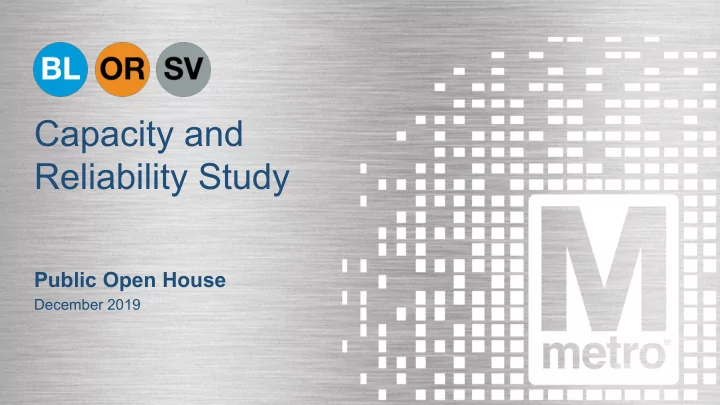

Capacity and Reliability Study Public Open House December 2019
BOS Capacity and Reliability Study | Open House Tonight’s activities Learn about BOS needs, goals, and objectives Review project concepts and provide input Ask questions Share your ideas Take the survey at Station 5! www.wmata.com/BOSstudy 2
BOS Capacity and Reliability Study | Purpose & Need Why we’re doing this study Running the Blue, Orange, and Silver lines through one tunnel creates serious challenges for Metro and customers, including crowding, managing construction and disruption, and lack of operational flexibility. We have studied these issues and identified potential solutions, but haven’t yet made a decision. As these problems persist, we need to agree on a fix. This study will determine that preferred solution. www.wmata.com/BOSstudy 3
BOS Capacity and Reliability Study | Purpose & Need Where we’re focusing attention Ashburn Wie iehle le Ne New Ca Carrollt llton Largo go Tow Town Center er Vienna Pentagon gon www.wmata.com/BOSstudy 4
BOS Capacity and Reliability Study | Purpose & Need Why we’re doing it now www.wmata.com/BOSstudy 5
BOS Capacity and Reliability Study | Purpose & Need: Reliability Interlining creates (and compounds) delays and crowding Delays on one line cascade to the others Surges of delayed passengers at transfer stations affect all lines Crowding on trains, platforms, escalators creates significant safety issues Major disruptions can impact Yellow and Green service www.wmata.com/BOSstudy 6
BOS Capacity and Reliability Study | Purpose & Need: Reliability Metro needs to maintain customer-focused service while rebuilding But we lack the infrastructure to: Maneuver around work zones Minimize the extent and impacts of single tracking Store and dispatch relief trains Vary service patterns www.wmata.com/BOSstudy 7
BOS Capacity and Reliability Study | Purpose & Need: Capacity Metro ridership in the study area will grow with development… The region is forecasted to add 1.5 million people, 650,000 households, and 1.1 million jobs by 2045. A lot of that growth will be in the study area. www.wmata.com/BOSstudy 8
BOS Capacity and Reliability Study | Purpose & Need: Capacity …but we lack the capacity to meet current and future demand Core segments already at or over peak carrying capacity Peak service in the core will be severely crowded by 2040 Will need both 100% 8-car trains and higher frequencies 100% 8-car trains won’t solve the problem, can’t increase frequencies while interlined www.wmata.com/BOSstudy 9
BOS Capacity and Reliability Study | Purpose & Need: Capacity Sharing the tunnel limits our ability to increase service Maximum of 26 trains per hour (TPH) through any tunnel/set of tracks Under 8-min headways we can deliver equal service, but not enough to meet demand Under 6-min peak schedule, Blue Line had to be reduced to 5 TPH Cannot improve peak headways and meet demand on all 3 lines 8-minute headway 6-minute headway ~ 8 5 ~ 8 11 ~ 8 10 www.wmata.com/BOSstudy 10
BOS Capacity and Reliability Study | Purpose & Need: Flexibility Metro lacks flexibility to match service to demand, for more efficient use of scarce resources Some places generate high ridership but can’t get more service Other areas have less demand but the same level of service Transit-oriented development would boost ridership Additional infrastructure would let Metro match service to demand www.wmata.com/BOSstudy 11
BOS Capacity and Reliability Study | Purpose & Need: Sustainability Metro will be a sustainability champion The study will recommend projects that help meet our sustainability targets, strengthen our finances, reduce the region’s environmental footprint, and expand access to economic opportunity www.wmata.com/BOSstudy 12
BOS Capacity and Reliability Study | Goals Goal 1: Provide Sufficient Rail Capacity to Serve Ridership Demand Goal 2: Improve Reliability and On-Time Performance Goal 3: Improve Operational Flexibility and Cost-Efficiency Goal 4: Provide Transportation Options That Support Sustainable Development and Strengthen Metro’s Finances www.wmata.com/BOSstudy 13
BOS Capacity and Reliability Study | Study Process Study timeline Concepts become specific alternatives Jan/Feb 2020 Target outcomes Regional input and consensus on a preferred solution/strategy Board approval of the preferred solution Funding and implementation plan www.wmata.com/BOSstudy 14
BOS Capacity and Reliability Study | Public Engagement Public engagement Round 1: Round 2: Round 3: Solutions Issues/Awareness Alternatives • Summer 2020 • Register for our • Summer 2019 • Winter 2019 mailing list to hear • Complete • In progress about engagement • Website • Public open houses opportunities • Pop-ups • Online survey • Handouts • Updated website www.wmata.com/BOSstudy 15
BOS Capacity and Reliability Study | Other Engagement Stakeholder committees METRO COMMUNITY www.wmata.com/BOSstudy 16
BOS Capacity and Reliability Study | Open House Open house/public engagement Universe of Fall 2019 Alternatives Generate a “universe” of potential options to be screened and evaluated by project team Reliability Final recommendation will be a Screening Criteria: Capacity • Serves Study Area corridor strategy, consisting of • Purpose & Need • BOS Goals both short-term and longer-term • Implementation Flexibility Timeline ≤ 20 yrs improvements. Please be creative and bold in your suggestions! Refined Spring 2020 Set of Alternatives www.wmata.com/BOSstudy 17
BOS Capacity and Reliability Study | Open House Draft project concepts There are many options for achieving the four study goals. You’ll see several of them on boards around the room tonight. They fall into two main categories: operational and infrastructure improvements. We want to hear what you think about these draft concepts. Is there a way to improve one or more of them? Do you think we missed something? Tell the project team and take the survey at Station 5! www.wmata.com/BOSstudy 18
Recommend
More recommend